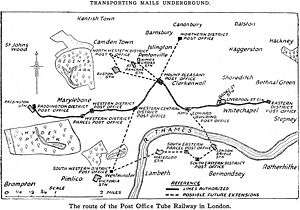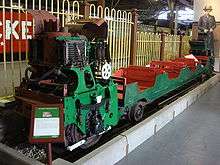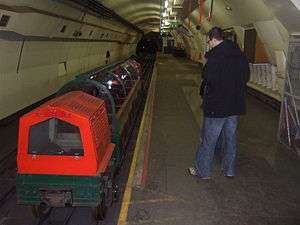London Post Office Railway
| London Post Office Railway | |
|---|---|
|
A station on the railway with sight-seeing train | |
| Overview | |
| Type | Private industrial railway |
| Status | Mothballed |
| Locale | London, United Kingdom |
| Termini |
Paddington Sorting Office Whitechapel Eastern Delivery Office |
| Stations | 8 |
| Services | 1 |
| Operation | |
| Opened | 3 December 1927 |
| Closed | 31 May 2003 |
| Owner | Royal Mail |
| Depot(s) | Mount Pleasant |
| Rolling stock | 1980 Greenbat |
| Technical | |
| Line length | 6.5 miles (10.5 km) |
| Number of tracks | Two-four-six |
| Track gauge | 2 ft (610 mm) |
| Loading gauge | Custom gauge |
| Electrification | 440 V DC CR |
| Operating speed | 40 mph (64 km/h) through core tunnels; 7 mph (11 km/h) through stations, platforms and loops |
| Highest elevation | 70 feet (21 m) below street level |
The Post Office Railway, also known as Mail Rail, is a 2 ft (610 mm) narrow gauge, driverless underground railway in London that was built by the Post Office with assistance from the Underground Electric Railways Company of London, to move mail between sorting offices. Inspired by the Chicago Tunnel Company,[1] it operated from 1927 until 2003.[2][3] Part of the railway will be opened to visitors in mid-2017.[4]
Geography
The line ran from Paddington Head District Sorting Office in the west to the Eastern Head District Sorting Office at Whitechapel in the east, a distance of 6.5 miles (10.5 km). It had eight stations, the largest of which was underneath Mount Pleasant, but by 2003 only three stations remained in use because the sorting offices above the other stations had been relocated.
History

In 1911 a plan evolved to build an underground railway 6 1⁄2 miles (10.5 km) long[5] from Paddington to Whitechapel serving the main sorting offices along the route; road traffic congestion was causing unacceptable delays. The contract to build the tunnels was won by John Mowlem and Co.[6] Construction of the tunnels started in February 1915 from a series of shafts. Most of the line was constructed using the Greathead shield system, with limited amounts of hand-mining for connecting tunnels at stations.
The main line has a single 9-foot (2.7 m) diameter tube with two tracks. Just before stations, tunnels diverge into two single-track 7-foot (2.1 m) diameter tunnels leading to two parallel 25-foot (7.6 m) diameter station tunnels. The main tube is at a depth of around 70 feet (21 m).[7] Stations are at a much shallower depth, with a 1-in-20 gradient into the stations. The gradients assist in slowing the trains when approaching stations, and accelerating them away. There is also less distance to lift mail from the stations to the surface. At Oxford Circus the tunnel runs close to the Bakerloo line tunnel of the London Underground.
During 1917 work was suspended due to the shortage of labour and materials. By June 1924 track laying had started. In February 1927 the first section, between Paddington and the West Central District Office, was made available for training. The line became available for the Christmas parcel post in 1927 and letters were carried from February 1928.
In 1954 plans were developed for a new Western District Office at Rathbone Place, which required a diversion, opening in 1958.[8][9] It was not until 3 August 1965 that the new station and office were opened by the Postmaster General, Anthony Wedgwood-Benn. The disused section was used as a store tunnel; some parts of it still have the track in place.
Closure
A Royal Mail press release in April 2003 said that the railway would be closed and mothballed at the end of May that year. Royal Mail had earlier stated that using the railway was five times more expensive than using road transport for the same task. The Communication Workers Union claimed the actual figure was closer to three times more expensive but argued that this was the result of a deliberate policy of running the railway down and using it at only one-third of its capacity. Despite a report by the Greater London Authority in support of continued use, the railway was closed in the early hours of 31 May 2003.[3]
In April 2011 an urban exploration group called the "Consolidation Crew" published accounts to illicit access to the tunnels. Detailed photography and text revealed that the railway is still largely in good condition, despite some natural decay.[10][11]
A team from the University of Cambridge has taken over a short, double track section of unused Post Office tunnel near Liverpool Street Station, where a newly built tunnel for Crossrail is situated some two metres beneath. The study is to establish how the original cast-iron lining sections, which are similar to those used for many miles of railway under London, resist possible deformation and soil movement caused by the new works. Digital cameras, fibre optic deformation sensors, laser scanners and other low-cost instruments, reporting in real time, have been installed in the vacated tunnel. As well as providing information about the behaviour of the old construction materials the scheme can also provide an early warning if the new tunnel bores are creating dangerous soil movement.[12]
Future development and preservation
In October 2013 the British Postal Museum & Archive announced it intends opening part of the network to the public.[13][14]
The plans have been approved by Islington Council and while the museum is expected to open in 2016, work on the new museum and the railway began in 2014,[15] though the railway should be open by 2020.[16]
Special tourist trains were installed in late 2016, with plans to open the route from Whitechapel to Paddington by mid-2016, with access through the depot at Mount Pleasant, and the journey lasting around 15 minutes.[4]
Rolling stock
The first stock was delivered in 1926 with the opening of the system. All stock used was electrically powered.

Electric locomotives
- 1926 Electric Locomotives — Original locomotives
Electric units
- 1927 Stock — Original stock
- 1930 & 1936 Stock — Replacement stock for 1927 Stock
- 1962 Stock — Prototype stock
- 1980 Stock — Replacement stock
Some trains have been preserved at the Launceston Steam Railway.[17]
In fiction
- The railway features in the novel The Horn of Mortal Danger in which there is a connecting tunnel to a secret railway to the North London network. The only other known connection is in the disused tunnel between Highgate and the disused Cranley Gardens.
- A version of the railway is featured in the novel The Great Game by Lavie Tidhar. It takes mail to Buckingham Palace, and is run by the book's featured Simulacra.
- The railway appears in the film Hudson Hawk as 'Poste Vaticane' in the Vatican City. Bruce Willis (as Hawk) stows away in one of the mail containers.
- A mail train system closely based on the railway is in Charlie Higson's third Young Bond book, Double or Die.
Similar railways
A pneumatic underground railway[18] was used by the Post Office in London between 1863 and 1874 using individual wheeled capsules, operated by the London Pneumatic Despatch Company.
In 1910 a 450-metre (1,480 ft) tunnel railway opened in Munich, Germany between München Hauptbahnhof and the nearby Post office. The tunnels were damaged in World War II, restored in 1948 and partially rebuilt in 1966 to allow for the first Munich S-Bahn tunnel. Operations ceased in 1988.[19]
The Chicago Tunnel Company delivered freight, parcels, and coal, and disposed of ash and excavation debris. It operated an elaborate network of 2 ft (610 mm) narrow gauge track in 7.5-by-6-foot (2.3 m × 1.8 m) tunnels running under the streets throughout the central business district including and surrounding the "Loop".
See also
References
Notes
- ↑ Karslake, Colin. "Speeding London's Mail". MailRail.co.uk. Retrieved 19 August 2009.
- ↑ Subterranean city: beneath the streets of London. Antony Clayton. 2000
- 1 2 "Final delivery for Mail Rail". This Is Local London. 30 May 2003. Retrieved 19 August 2009.
- 1 2 "Take a ride through the Post Office Railway tunnels". Ian Visits. 2 December 2016.
- ↑ Romance of London's Underground, Ayer Publishing
- ↑ Time capsules
- ↑ "London's Post Office Railway", Popular Mechanics, 97 (3), March 1952, p. 164, ISSN 0032-4558
- ↑ Blackford, S.; Cuthbert, E. W. (1960). "Underground Station for Western District Post Office, London. (Includes Plate)". ICE Proceedings. 15 (2): 81. doi:10.1680/iicep.1960.11893.
- ↑ Collingridge, V. H.; Tuckwell, R. E. (1960). "Underground Station for Western District Post Office, London. (Includes Plates)". ICE Proceedings. 15 (2): 95. doi:10.1680/iicep.1960.11897.
- ↑ "Security-Breach: London Mail Rail". www.placehacking.co.uk. Retrieved 26 April 2011.
- ↑ "The Post Office Railway (Mail Rail)". www.silentuk.com. Retrieved 20 April 2011.
- ↑ "Bridging the Knowledge Gap in London's 'Secret Tube'". Cambridge Centre for Smart Infrastructure & Construction. Retrieved 16 June 2014.
- ↑ "Mail Rail: The hidden trains under London's streets". BBC.
- ↑ "Mail Rail". British Postal Museum & Archive.
- ↑ Solon, Olivia (14 March 2014). "Ride London's abandoned underground 'Mail Rail'". Wired UK. Retrieved 8 June 2014.
- ↑ "BBC News - Mail Rail: What is it like on the 'secret' Tube?". BBC Online. Retrieved 28 January 2014.
- ↑ Launceston Steam Railway
- ↑ Martin, Andrew (10 January 2013). Underground Overground. Profile Books. ISBN 1846684781.
- ↑ "Deutsche Bundespost, Bahnpostamt, 80335 München". Bahn-Express (in German). Retrieved 12 December 2013.
Literature
- Bayliss, Derek A. (1978). The Post Office Railway London. Sheffield: Turntable Publications. ISBN 0-902844-43-1.
- "Post Office Underground Railway (Mail Rail)". British Postal Museum & Archive.
- Bradley Garrett (2013). "Explore Everything: Place-Hacking the City." Verso Books, London. ISBN 978-1781681299
- "The Post Office (London) Railway". The Post Office Electrical Engineers' Journal. 21 (2): 147–154. July 1928.
- Mackay, A.C. (April 1966). "The New Post Office Railway Station at the New Western District Office". The Post Office Electrical Engineers' Journal. 59 (1): 12.
- Finden, R.E.; Piqué, P; Kettridge, K. (January 1984). "New Transformer/Rectifier Units for the Post Office Railway". British Telecommunications Engineering. 2 (4): 256.
- Mew, G. M. (1964). "The post office railway". Proceedings of the Institution of Mechanical Engineers, Conference Proceedings 1964-1970. 179 (1964): 39. doi:10.1243/PIME_CONF_1964_179_009_02.
Further reading
- "Going underground to avoid the jam". RAIL. No. 334. EMAP Apex Publications. 1–14 July 1998. pp. 36–41. ISSN 0953-4563. OCLC 49953699.
External links
| Wikimedia Commons has media related to London Post Office Railway. |
- Enthusiast Website Unofficial MailRail Web Page
- Detailed information on construction and operation.
- The British Postal Museum & Archive
- Silent UK Comprehensive detail, based upon complete exploration. (Web-Archived here)
- Place Hacking A collective report of the trespass into the network by urban explorers in 2011.
- Guardian article on proposed mothballing.
- GLA report on the closure in PDF format.
- Winchester, Clarence, ed. (1936), "Driverless subway trains", Railway Wonders of the World, pp. 313–319, description of the Post Office Railway in the 1930s
- BBC article A video from the mothballed railway, detailing plans for future use.
- Mail rail in openstreetmap.org
